D Double E: “What made me look at the mic is nothing to do with grime”
The ongoing story of a British rap godfather, told over a feast of oysters
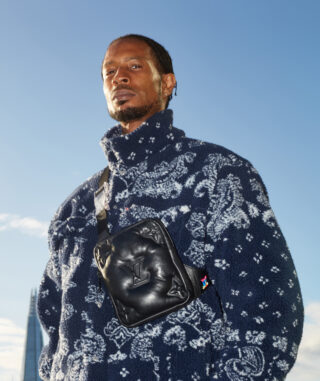
The ongoing story of a British rap godfather, told over a feast of oysters
“Jheez bruv, I need to put Danny Brown in a headlock!” exclaims D Double E as a dozen oysters are placed down in front of us. He’s yet to meet the Detroit rapper, but his feature on Double’s latest EP suggests an animated chemistry that surely bleeds into a real life interaction. Danny, consider this your warning; come prepared for battle.
East London born and raised, D Double E came to prominence during grime’s initial rise in the early ’00s, cutting a distinct figure with an offbeat vocal style that perfectly matched the nascent genre’s frenetic energy. He’s long been known as your favourite MC’s favourite MC, hailed as the best to ever do it by fellow luminaries Dizzee Rascal and Skepta. Over the past two decades, he’s become something of an alternative national treasure, with his buoyant personality finding him in far-flung places, his 2019 Christmas advert for Swedish flatpack giants IKEA being a perfect example.
Today we’re sat in Double’s favourite seafood restaurant to discuss the new project, No Reign. No Flowers. and to celebrate a career that helped lay the ground for the next generation of UK vocalists. In real life, he’s a welcoming presence, his answers lightened with honesty and absurdist Cockney humour.
“You ever cheers an oyster before?” I ask. “Oiiii,” he responds receptively. We clink shells, sink ‘em, and we’re off…
The new project is helmed solely by producer TenBillionDreams, who previously played a large part in the production of Ghetts’ acclaimed 2020 album Conflict of Interest. Ghetts and Double have a long history, way back to before grime was called grime. Both were part of N.A.S.T.Y Crew, who alongside the likes of Pay As U Go, Slew Dem and Ruff Sqwad, are seen as key architects of the sound. The group was also home to Kano, Stormin’ and Jammer at various points in its fractured timeline. Ghetts appears on standout track ‘Glory’, a victory lap of sorts for the pair.
Double met TenBillion by chance at the video shoot for Ghetts’ ‘Skengman’ single. “I realised he was best mates with my cousin!” he explains. “It was like, ‘We’re family! Let’s get the number.’” Soon enough they were in the studio together. “We had a vibe. He showed me five tracks. I recorded three. Those three tracks ain’t even on the project! That was just the beginning.” I ask what the benefit of working with one producer is. “The benefit is the movie. The scenes,” he says, gesturing an up-and-down motion with his hands. “It’s tailored.”
Danny Brown, the soon-to-be-recipient of a headlock, appears on ‘Afterthought’, the highlight of the EP. Danny’s long been a vocal advocate for UK music, shouting out everyone from The Streets to underground grime legend Darq E Freaker. “For yeaaars, bruv!” Double nods. “Danny Brown’s just a mad spitter,” he adds. “I love his voice… He just always used to show love, man. He’s the original don.”
Nowadays, North Americans look back across the Atlantic for inspiration, be it the influence of London drill on current New York hip hop, or artists like Drake co-opting British slang and style, but this wasn’t always the case.
“They didn’t give a fuck,” says Double. “They used to extort us, 40 grand for a verse!” he recalls with fervour. “We were being told we weren’t real. Tea and biscuits! I used to gun down people from the UK that sounded like Americans. I didn’t like my UK army trying to sound like them.” I suggest we rewind a little, back to where it all started.
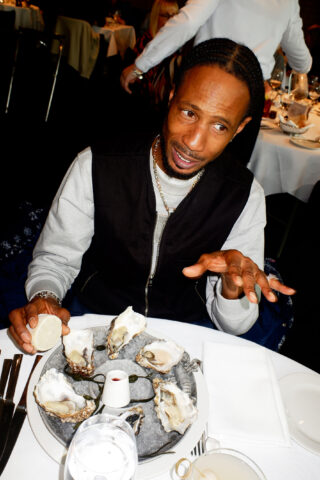
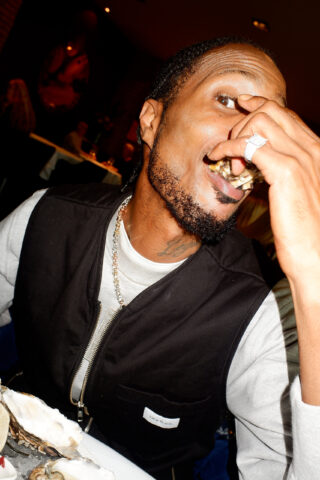
The term grime, like punk or acid house, is now firmly welded into the accepted lineage of British music, and for good reason: not only was it some of the most sonically arresting music to ever birth from the UK, but more importantly, it ushered in the first great age the British MC. UK hip hop, dancehall, jungle and garage had each produced iconic British vocalists through the ’80s and ’90s, but the sheer volume of unique voices that came to prominence through grime is incomparable.
D Double E stood firmly at the precipice of this shift in culture. “It was already a scene,” he asserts, “I just felt like some name came hunting us down. I didn’t like it because grime is dirt. I just thought it was something that would pass.” By this time, Double had been emceeing for years. “Up until then we looked at ourselves as artists capable of anything to do with picking up the mic.” I ask what made him pick up the mic in the first place. “I was emceeing in school, in the playground. I had a friend that used to do beatboxing… It weren’t nothing to do with being professional back then, we were just having fun.” Double likens it to playing football in the back garden; just kids being kids. A friend of his had a record player. “He had a lot of records. Reggae, old skool dancehall, a few R&B tracks… I was on the mic, reggae dancehall sort of bars. That’s what we grew up on.”
Soon one deck became two, and jungle music began to infiltrate the record collection. The friends recorded tapes that they distributed locally, complete with mock shout-outs to family and friends. “I’d be like, ‘Big up my cousin, and my sister,’ like I was on radio,” he smiles. “When the tape was done, I would give it to them.”
The operation soon moved from his friend’s bedroom to house parties, with Double in tow as resident MC. Then the pair caught their first club set, while still underage. “It was in a club called Palace Pavilion, but it had a different name [at the time]… this place was a real Jamaican vibe.” Did it spark something within him? “It didn’t really,” he admits. “It was more like, ‘Who are these guys?’ When I look back at it, it was just practice.”
Besides raves, pirate radio was the lifeblood of the scene. A few years on from the bedroom tapes saw Double frequenting the local FM waves. “Around 18, I start slippin’ on a few stations,” he recalls. It was on Flava FM that he gained a show with 187, his crew at the time. At this point, UK garage had become the main sound. I asked Double if he’d noticed the sound getting darker, slowly mutating into what would become know as grime. “It was always there for me,” he states, before mentioning tracks like DJ Zinc’s ‘138 Trek’, E.S. Dubs’ ‘Standard Hoodlum Issue’ and Reservoir Dogs’ ‘Buddah Finger’ as examples of the darker garage sound. “They had that element in there,” he notes. “That’s when I came in. There was space for me… I’d felt stuck between hip hop and bashment growing up, until I heard the UK [sound].”
Through pirate radio, Double gained a strong reputation. When 187 dissolved, he found himself taking a few months away from music, but incessant calls from friends eventually pulled him back into the FM orbit. The offer he couldn’t refuse was an invitation to feature with N.A.S.T.Y Crew, who had previously followed 187’s show on Flava FM. What began as a few guest appearances graduated into a fully-fledged membership to the group.
Before long, Double was back at the newly renamed Palace Pavilion performing alongside his new crew. While his reputation had surely been rising, it wasn’t till he stood on stage again that he was sure of it. “It was maybe three years later…” he observes. “I went on the mic and I said one thing, and it was just tremendous… We said our lyrics and everyone in the club knew everything we were saying… It was all because of radio.” The reaction has been the same ever since.
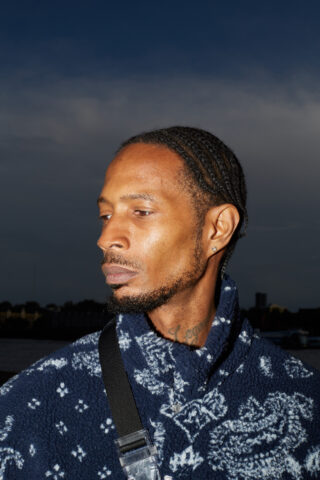
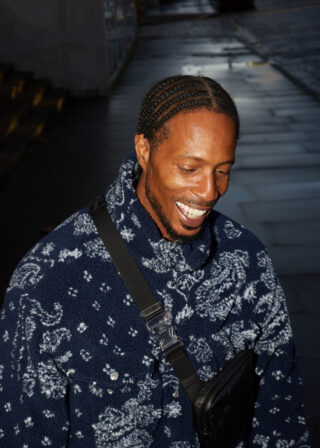
How all of this translates into a two-decade long career is a more complicated matter. For all the talent spilling out of the UK at the time, it took a while for most artists to find their footing within the industry. Some, like Dizzee Rascal, forged a path early on with iconic debut albums, before successfully veering into the pop realm. Others fell to the wayside entirely. Even artists like Skepta took a fair few missteps before rising to the top years later.
Double managed to remain a fixture on the scene, at first with his group Newham Generals, alongside Footsie and Monkstar. The group formed in the fallout of N.A.S.T.Y Crew’s implosion, and has remained to this day (though Monkstar has since left). It’s hard-nosed grime at it’s best, with tracks like ‘Frontline’ remaining some of the most formidable tracks of the era.
Double’s solo career took a little longer to take shape, release-wise. I ask him about his first mixtape On Tha Double, released in 2006. “That was fraud,” he declares. “It was nothing to do with me.” The first he knew of it was when he was walking through Wembley Market and saw it for sale at a stall. “It’s the first moment of the internet when you were able to make fake CDs,” he says. “It was burning season!” It’s interesting how these things become canon; third generation YouTube uploads of bootlegged mixtapes becoming integral parts of an artist’s history. “I don’t know how to feel about it,” he says. “To this day everyone always talks to me about it, so I feel like I need to give them some credit.”
So what was the first actual release? It’s hard to say. Double mentions a mixtape by Newham Generals entitled Welcome To Newham released on Dizzee Rascal’s Dirtee Stank imprint, but beyond a few old blog posts, it seems impossible to find today. It’s further proof of how much of this era is lost to the current streaming climate. It was stuck between physical releases, radio broadcasts and the Wild West of the early internet. Much of the material is buried across forgotten servers, disused forums and broken hard drives.
But since then, Double has shone as a solo artist, both on his albums (released on his own Bluku label), and as a consistent collaborator. Singles like ‘Street Fighter Riddim’ and ‘Bad 2 Tha Bone (Wooo Riddim)’ not only cemented his mastery of grime, but stand as some of the most iconic tracks in the genre. Elsewhere, recent features for the likes of Mall Grab and Swindle have established his crossover appeal, and tracks with young British rappers like Unknown T solidified his place as a respected elder statesman. Then there’s the advertising campaigns for IKEA and Pepsi that propelled him further into the public consciousness.
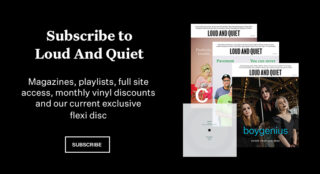 Throughout our conversation, the urge to avoid categorisation is a recurring theme. “I met grime when I was 18 or 19. What made me look at the mic is nothing to do with grime. What made me sit in my house and come up with lyrics, go radio, it’s nothing to do with it.” He’s very open when discussing his past, it just seems that the hyper-fixation of a certain era has left him at times exasperated. “I’m just trying to be human and not a robot,” he says. “If you could go back to your grime robot at home, and then push the button and everything is like back in the day, some people would just be happy with that.”
Throughout our conversation, the urge to avoid categorisation is a recurring theme. “I met grime when I was 18 or 19. What made me look at the mic is nothing to do with grime. What made me sit in my house and come up with lyrics, go radio, it’s nothing to do with it.” He’s very open when discussing his past, it just seems that the hyper-fixation of a certain era has left him at times exasperated. “I’m just trying to be human and not a robot,” he says. “If you could go back to your grime robot at home, and then push the button and everything is like back in the day, some people would just be happy with that.”
It’s important to point out this isn’t said with a sense of defeatism, more a sense of forward momentum. In some ways he sees himself as the same kid in the bedroom: “As little kids, give us the mic, any beat, and we’d have gone crazy,” he explains. “I’m big enough to attack what I want. Don’t cater for me [musically]… I’ve learned that you’ve got to keep it moving.” As we finish up, he extends these thoughts to the new generation: “Where the youth are today: drill music, Unknown T – they grew from what we’ve done. But they’re also artists [in their own right].”
It’s true that this is all best viewed as an ongoing musical development, best left to morph at its own pace, and into whichever directions the artists see fit. D Double E is proof that with persistence and artistic conviction, there’s a good life to be found in it.